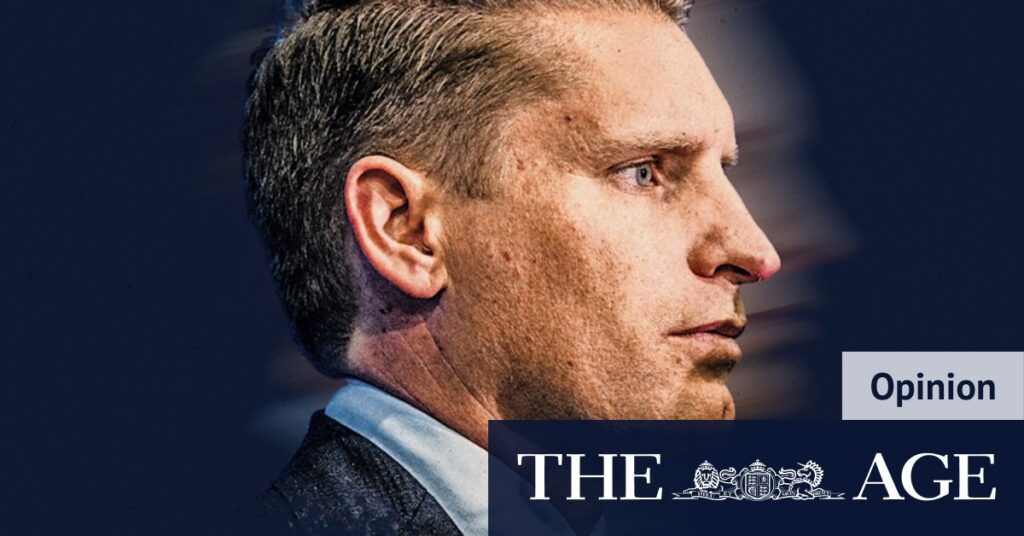
“The train coming down the tracks isn’t the one that you expected. It’s not the one advertised on the board,” says actor Benedict Cumberbatch in his portrayal of Dominic Cummings, a pro-Brexit strategist, in the 2019 movie Brexit: The Uncivil War. This line, delivered with a sense of inevitability, resonates deeply with Australian politician Andrew Hastie, who often references it in private discussions to illustrate the current state of Western democratic politics.
Andrew Hastie, a prominent figure within the Liberal Party, sees the same nativist impulses that fueled Brexit and currently bolster Nigel Farage’s Reform Party in the UK as forces that could shape Australia’s political landscape. He believes that if the concerns of the populace are not addressed, others will seize the opportunity. This belief drove his involvement in shaping the Liberal Party’s immigration policy, a commitment so strong that it led to his resignation from the opposition frontbench over his exclusion from policy development.
Resignation and Political Strategy
The political arena is abuzz with theories about Hastie’s resignation. Some view it as a tantrum, while others see it as a calculated move. However, the manner of Hastie’s departure suggests a principled stand rather than a mere display of discontent. Upon realizing his exclusion from immigration policy development, Hastie adhered to his personal policy of a 48-hour cooling-off period before making any significant decision.
Rather than engaging in subversive tactics, Hastie sought counsel from a select group of trusted allies, including only two Liberal MPs, to avoid accusations of plotting a leadership challenge. He candidly discussed the financial implications of his decision with his wife, Ruth, who supported him despite the potential 25% pay cut. On a Friday morning, Hastie informed opposition leader Sussan Ley of his resignation, citing his inability to maintain cabinet solidarity on immigration issues.
Principles Over Politics
Hastie’s resignation is not an act of hostility towards Ley. In fact, he has publicly expressed his support for her leadership, emphasizing the absence of a unified bloc against her. However, his departure allows him greater freedom to voice his views on immigration and other key issues from the backbench.
While Hastie respects Ley’s mandate and the seniority of Angus Taylor, the leader of the Liberal Party’s conservative faction, he is positioning himself on more conservative ground. This strategy enables him to advocate for a reduction in immigration levels, a stance he believes is necessary to address public concerns and ensure the sustainability of the Australian dream.
Immigration Policy: A Point of Contention
Hastie’s stance on immigration is not about shutting down the program but rather about recalibrating it. He advocates for a return to immigration levels from a decade ago, effectively halving the current intake. This includes scrutinizing the role of international students, whom he believes are being used by universities as a revenue source.
Despite his conservative approach, Hastie’s views are not rooted in xenophobia. His upbringing in a multicultural community and his experience in his father’s church, which embraced diverse congregations, inform his perspective on successful multiculturalism. However, he warns that failure to address immigration concerns could lead to political upheaval, with parties like Pauline Hanson’s One Nation poised to capitalize on public frustration.
Looking Forward: A Calculated Approach
At 43, Hastie has time on his side. He plans to focus on his family while developing his social media and policy profiles, particularly on issues like climate change, housing, and productivity. His approach is inspired by late Formula 1 champion Ayrton Senna’s philosophy: “If you no longer go for a gap that exists, you’re no longer a racing driver.”
Hastie is determined to seize the opportunity to influence immigration policy, positioning himself as a key player in the evolving political landscape. However, he remains mindful of the lessons from history, acknowledging that the path he chooses could lead to unpredictable outcomes.
In the end, Hastie’s journey is a testament to the complexities of modern politics, where principles and pragmatism must coexist in the pursuit of meaningful change.





